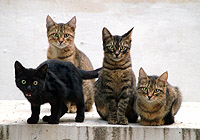Client Education
FIV is a slow, chronic contageous disease of cats, due to the replication of a virus that is similar to the human AIDS virus. Even though FIV is closely related to human AIDS, the virus is very specific to members of the cat family.
Feline immunodeficiency virus (FIV) vaccination is quite controversial due to the interference of vaccinating with diagnostic testing. Like FeLV, FIV is a retrovirus and causes immunosuppression.

Transmission of FIV occurs through bite wounds. Due to their aggressive territorial behavior, non-neutered male cats are most commonly infected. Any cat that is bitten by another cat is at risk of contracting FIV. Casual contact between cats does not appear to be a major factor in disseminating the disease.
Lymphocytes are important cells involved in the body's immune (defense) system. FIV infects and destroys these lymphocytes. Without lymphocytes, immunodeficiency results and the body is open to infection. Symptoms associated with FIV are generally due to secondary bacterial, viral, and fungal infections.
3 Stages of FIV Infection
The diagnosis of FIV is made by a veterinarian. The history, clinical symptoms of the disease, and the results of a specific blood test are instrumental in diagnosing the disease.
[ Search Articles ] [ Article Index ] [ Previous Page ]